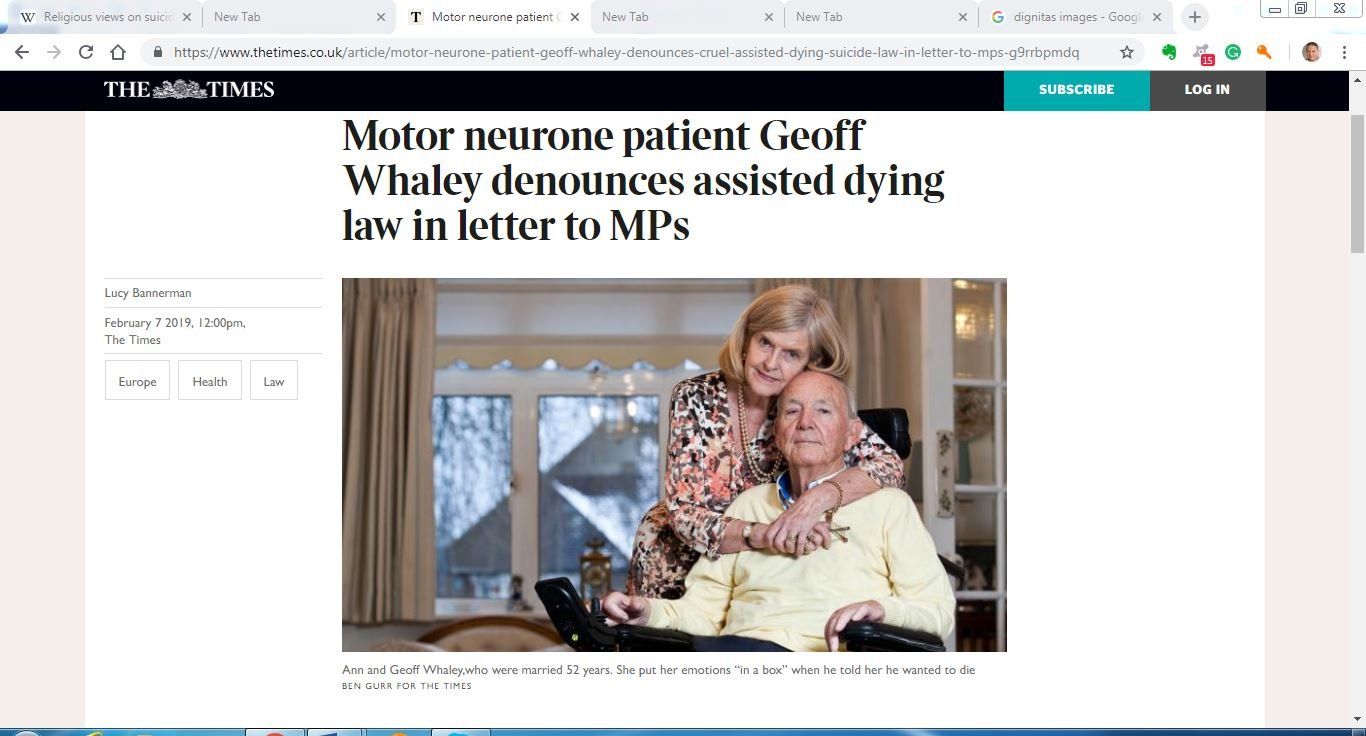The dilemma of Dignitas and the request that haunts me

I have been haunted by this week’s news about Geoff Whaley the 80 year old who has ended his own life at Dignitas in Switzerland – aided by his wife of 52 years who could not bear to see him go through the agonizing end promised by motor neurone disease. So many aspects of this are so desperately sad, not least the fact that Mr. Whaley was forced to make this decision by this awful disease. No doubt the anonymous phone call to social services, which led to Mrs. Whaley being interviewed by the police, was made by someone who probably had the best intentions but it robbed Geoff and his wife of hard won peace about their decision. And what an appalling choice this loving wife had to make between helping her husband leave this earth painlessly and with dignity, and abiding by a UK law that meant that she could face prosecution and a fourteen year custodial sentence.
This sorry tale brings back some very difficult personal memories for me - some very recent. In November 2018, I received a call from a friend in Corfu to say that my aunt was suffering from advanced skin cancer and had asked for her nieces to take her to Dignitas to spare her a painful and terrible death. She had no children of her own so, as her eldest niece, I was the first port of call.
Over the past few years she had asked me several times to promise her that that if she ever became infirm or unable to live on her own that I would take her to Dignitas. She was fiercely independent and could not bear the idea of ending up in a Greek care home, or worst of all having to leave her home of the last sixty years and return to the UK. I had always fudged the issue, and failed to give a response – but at the end of last year, time ran out and the ask was not hypothetical but desperately real.
The whole discussion had always filled me with horror. As a Christian I have a deep seated respect for the sanctity of life and a belief that what God has given only he can take away. I don’t profess to have studied the doctrinal views of suicide in detail but I am aware that the church has historically considered suicide as a grave sin; partly because we are made in the image of God, and because suicide suggests no possibility of hope or redemption.
I have a deep rooted dread of the idea of suicide. As I have written about in my memoir Sea Changed, my own father suffered from manic depression and first told me that he wanted to take his own life when I was eleven years old. He eventually of natural causes when I was in my 30s, but I was always terrified as a child and young adult that he would take his own life. When my aunt first asked me if I would assist her in committing suicide through Dignitas it brought back the sense of underlying dread that haunted me for so many years.
But as I got on the plane out to Corfu, I found myself questioning all my assumptions. My aunt had professed to be an atheist most of her life, but we had had some profound discussions about spirituality and ‘that God stuff I did’; so I knew that the task that lay ahead of me was not only practical but spiritual I had to help her die well and that meant helping her in these last days and weeks to prepare to meet her maker; to understand that what awaited her was a love beyond her imagining.
But if she was to grasp the reality of Christ and his promise of eternal life, what would it say to her if the only person she knew who did this ‘God stuff’ turned up and spouted doctrinal reasons for why she should be prevented from suffering such an awful death? If I spouted Bible verses at her to rationalize my own unwillingness to put myself out of my spiritual comfort zone (not to mention risk of prosecution to help her), what would it say about Christian love of neighbor (and relative). How in the face of such lack of empathy and rigid doctrine would she find the God of love in her final days?
In the end the decision was taken out of my hands. When my sister and I arrived in Corfu, we found she was far too ill to travel anywhere let alone Switzerland. She had sworn all her friends to secrecy until it was too late because she was afraid that I would drag her back to England for treatment. In fact I never would have done this – it would have been too cruel.
I have to confess that part of me felt a sense of relief that the decision had been taken out of my hands. Instead, we managed to get her wonderful palliative care at a hospital in Gouvia, which was staffed by angels. In that place, we talked about God, Jesus and what lay ahead, and I was able to pray with, and for, her to the end. And I will always be grateful to the Lord for that time.
But as I got back on the plane, after laying my beloved aunt to rest, I was left with the gnawing knowledge that there are no easy or pat answers to this complex issue. Perhaps the most that we can do if faced with this terrible dilemma is to ask -’what does love look like?’
My best-selling memoir Sea Changed (shortlisted as Christian Biography of the Year 2017) and latest book Sea Changed: A Companion Guide – Living a Transformed Life are available at Christian bookstores and Waterstones throughout the UK and online at eden.co.uk and Amazon worldwide. And my recent TBN UK TV series Living a Transformed Life can be seen at https://www.tbnuk.org/vod/watch/living-a-transformed-life/our-god-of-transformation
